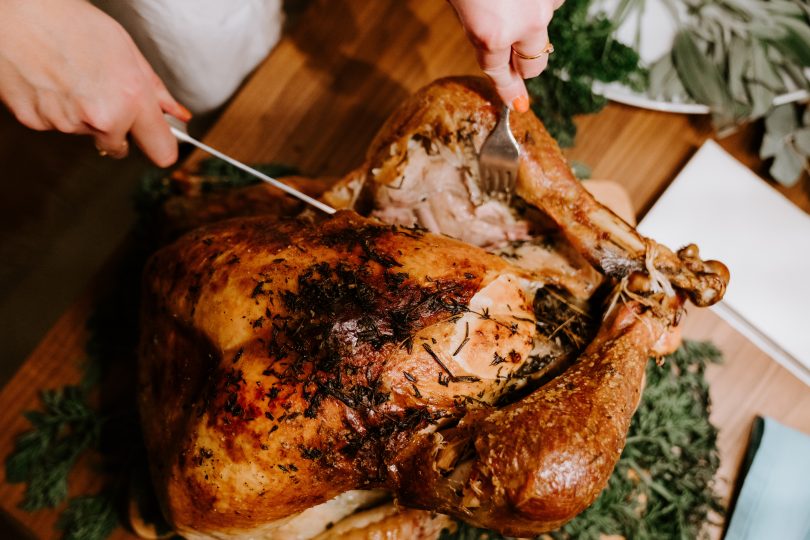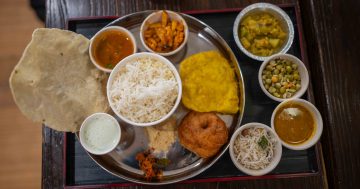
Christmas means meat … unless you happen to be a vegetarian or vegan. Photo: Claudio Schwarz.
Christmas is around the corner, which means Christmas parties (albeit COVID-19-era versions) are in full swing. For a vegetarian like me, that means repeatedly relaying my dietary requirements to numerous event organisers.
In doing so, I’ve noticed the positive change in our cultural attitude to vegetarians and vegans since I first stopped eating meat and fish back in 2004. As a teenage vegetarian, I was the constant butt of jokes, including many renditions of The Simpsons’ ditty, “You don’t make friends with salad”, which Bart and Homer taunt Lisa with when she eschews meat. (My brother still sometimes wheels this out at family dinners.)
These days, there are so many more unique dietary preferences and conditions in the general public – from vegetarians and vegans to lactose intolerant, gluten intolerant, Coeliacs, etc – that my garden-variety vegetarianism generally escapes any attention.
But when it does garner notice, it’s inevitably from someone who is so offended by my decision not to eat meat that they can’t help but hound me about it, to the point where I’m put off my plate of vegetables and carbs anyway. It’s got me thinking, what is it about my decision not to eat meat or fish that triggers a certain type of meat-eater?
The first reaction to when I say I’m vegetarian is, “Is that for cultural reasons?” or “Is your whole family vegetarian?” It’s a reasonable question, given I’m Indian, and many Hindus choose vegetarianism as an extension of their religion’s preaching on causing as little harm to other living beings as possible. My family isn’t Hindu though, and they all eat meat with gusto.
When I reply with “No, I’m vegetarian for ethical reasons”, the reaction is often one of extreme affront. The implication, of course, is that eating meat isn’t ethical. And frankly, in my opinion, it isn’t. That doesn’t mean I think I’m morally superior to all meat-eaters on all things – just that my decision to not eat meat is more ethical and their decision to eat meat. Undoubtedly, I commit many unethical acts regularly, but eating meat isn’t one of them.
What then unfolds is commonly a series of aggressive questions/statements, like: “But you wear leather, so how is that any different?”
“You know, growing grains and vegetables can emit more carbon emissions than raising animals?”
“Unless you’re vegan, you’re barely doing anything for animal welfare.” (This last one, I concede.)
The line of attack is usually focussed on exposing me for the hypocrite I must be, but of course it fails to acknowledge the nugget of truth at the core of the debate – I don’t eat meat. They do.
On that basis alone, I have less of a negative impact on animals and the environment than they do. Me not eating meat makes my attackers very uncomfortable. The way they deal with this discomfort is by trying to either prove my ethical standpoint is invalid, or construct an ethical framework to justify why they eat meat. But I would argue that this is impossible – because most people who eat meat do it because they enjoy it, not for ethical reasons or as an extension of their political identity.
Meat is tasty. Humans need the nutrients found in meat, and even though we can access them through non-meat sources, eating meat is the most efficient, and arguably the most enjoyable way to get them. (Full disclosure – I loved meat when I ate it. I know it’s delicious. I just don’t consume it anymore.)

Vegan Rising protest in Melbourne 14 April 2019. Photo: Facebook.
Last year, when animal rights activists blocked streets in Melbourne’s CBD to raise awareness of the plight of animals in factory farms, people were outraged at their audacity to interrupt the morning commutes of Melbournians. Diatribes about stupid vegan wet blankets and their detachment from reality hit screens everywhere.
Protests and demonstrations that cause genuine inconvenience are so effective because they trigger a reaction, so you have to hand it to the vegans who lay down on tram tracks and waited for police to try and remove them. I’m sure many of the objections to those protests were purely on the basis that the actions showed a lack of respect for fellow citizens who expected to be able to access their public transport and continue on their morning commutes like normal.
But another strand of reaction ran through the anti-vegan commentary, and it was similar to the type of snideness I’ve dealt with since choosing vegetarianism at age 14. It’s a reaction built from the same defensiveness I’ve outlined here, that I believe comes from a nugget of insecurity about the decision to eat meat – because deep down, people know that it’s hard to justify the mass farming of sentient beings for slaughter and consumption.
To some degree, I understand where this defensiveness comes from because I feel the same way when my vegan friends point out that the egg and dairy industries have some of the most grievous impacts on animal welfare out of any animal industries and that I’m still supporting those industries through my obsession with cheese. But I don’t try to contradict them. I just accept that I am lacking in the moral fibre and fortitude required to resist dairy and eggs in the food I enjoy consuming. They’re right, I’m wrong.
Why can’t omnivores concede the same? Why do vegetarians and vegans have reputations as being whiny, self-righteous lunatics, when their decisions don’t negatively impact anyone else, and indeed could have a positive impact on animal welfare if there was a critical mass of them? Why are omnivores so triggered by vegetarians and vegans, and is it because deep down, they know we have the moral high ground?





















